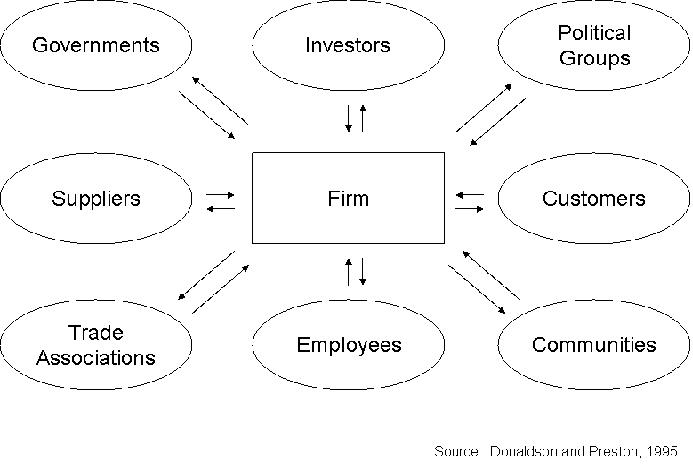Stakeholder theory
Stakeholder theory
Acronym
N/A
Alternate name(s)
N/A
Main dependent construct(s)/factor(s)
Firm performance
Main independent construct(s)/factor(s)
Stakeholder interests
Concise description of theory
Numerous views of Stakeholder Theory are presented in the literature though a key distinction can be drawn between the tenets of Stakeholder Theory and the conventional input-output model of the firm which see firms as converting investor, supplier, and employee inputs into customer outputs (Donaldson and Preston, 1995). In contrast, Stakeholder theory argues that every legimate person or group participating in the activities of a firm do so to obtain benefits and that the priority of the interests of all legitimate stakeholders is not self-evident.
Donaldson and Preston offer four central theses related to stakeholder theory.
- Stakeholder Theory is descriptive in that it offers a model of the corporation.
- Stakeholder Theory is instrumental in offering a framework for investigating the links between conventional firm performance and the practice of stakeholder management.
- Although Stakeholder Theory is descriptive and instrumental, it is more fundamentally normative. Stakeholders are identified by their interests and all stakeholder interests are considered to be intrinsically valuable.
- Stakeholder Theory is managerial in that it recommends attitudes, structures, and practices and requires that simultaneous attention be given to the interests of all legitimate stakeholders.
Diagram/schematic of theory
Originating author(s)
Freeman (1984)
Seminal articles
Donaldson, T. & Preston, L. 1995. The stakeholder theory of the modern corporation: Concepts, evidence and implications. Academy of Management Review 20, 65-91
Freeman, R. E. (1984). Strategic management : A stakeholder approach. Boston: Pitman.
Frooman, J. (1999). Stakeholder influence strategies. Academy of Management Review, 24(2), 191-205.
Hill, C. W. L., & Jones, T. M. (1992). Stakeholder-agency theory. Journal of Management Studies, 29(2), 131-154.
Jawahar, I. M., & McLaughlin, G. L. (2001). Toward a descriptive stakeholder theory: An organizational life cycle approach. Academy of Management Review, 26(3), 397-414.
Jones, T. M. (1995). Instrumental stakeholder theory: A synthesis of ethics and economics. Academy of Management Review, 20(2), 404-437.
Jones, T. M., & Wicks, A. C. (1999). Convergent stakeholder theory. Academy of Management Review, 24(2), 206-221.
Mitchell, R. K., & Agle, B. R. (1997). Toward a theory of stakeholder identification and salience: Defining the principle of who and what really counts. Academy of Management Review, 22(4), 853-886.
Originating area
Business Ethics
Level of analysis
Firm
IS articles that use the theory
Chan, C.M.L., & Pan, S.L. (2008). User Engagement in e-Government Systems Implementation: A Comparative Case Study of Two Singaporean e-Government Initiatives, Journal of Strategic Information Systems, Vol. 17(2), 124-139.
Chan, C.M.L., Pan, S-L. and Tan C-W. (2003). Managing Stakeholder Relationships in an e-Government Project, Proceedings of the 9th Americas Conference on Information Systems, Tampa, Florida. 783-791.
Chua, C. E. H., Straub, D. W., Khoo, H. M., Kadiyala, S., & Kuechler, D. (2005). The evolution of E-commerce research: A stakeholder perspective. Journal of Electronic Commerce Research, 6(4), 262-279.
Dimovski, V., & Skerlavaj, M. (2004). A stakeholder theory approach to the organisational performance and influence of information-communication technology: Model conceptualisation and testing. Economic and Business Review for Central and South - Eastern Europe, 6(3), 245-265.
Flak, L. S., & Rose, J. (2005). Stakeholder governance: Adapting stakeholder theory to e-government. Communications of the Association for Information Systems, 16(31), 1-46.
Pouloudi, A. (1999). Aspects of the stakeholder concept and their implication for information systems development. Proceedings of the 32nd Hawaii International Conference on System Sciences, Maui, Hawaii. 7030-7046.
Scott, M., Golden, W., & Hughes, M. (2004). Implementation strategies for e-government: A stakeholder analysis approach. Proceedings of the Twelfth European Conference on Information Systems, Turku, Finland.
Smith, H. J., & Hasnas, J. (1999). Ethics and information systems: The corporate domain. MIS Quarterly, 23(1), 109-128.
Vidgen, R. (1997). Stakeholders, soft systems and technology: Separation and mediation in the analysis of information system requirements. Information Systems Journal, 7(1), 21-46.
Zhang, J., Dawes, S. S., & Sarkis, J. (2005). Exploring stakeholders' expectations of the benefits and barriers of e-government knowledge sharing. Journal of Enterprise Information Management, 18(5/6), 548-567.
Links from this theory to other theories
N/A
External links
An article answering some key questions about Stakeholder Theory published in the Ivey Business Journal can be found at http://www.iveybusinessjournal.com/view_article.asp?intArticle_ID=471
A Harvard Business School working paper on Stakeholder Theory and Value Maximization can be found at http://hbswk.hbs.edu/item/1609.html
Wikipedia offers an overview at http://en.wikipedia.org/wiki/Stakeholder_theory
Examples of stated business objectives that incorporate the Stakeholder concept can be found at http://www.tutor2u.net/business/accounts/stakeholder_theory.htm
An article by Freeman et al. appearing in the May-June 2004 issue of Organization Science can be found at http://www.thunderbird.edu/wwwfiles/publications/magazine/fall2004/faculty-papers/2Corp-Obj-Freeman-Reply.pdf
A Powerpoint presentation on Stakeholder Theory can be found at http://www.csus.edu/indiv/e/estenson/117/Lect117_chp7.ppt
An extensive bibliography is presented at http://www.mgmt.utoronto.ca/~stake/Articles.htm
Original Contributor(s)
Brent Furneaux
Please feel free to make modifications to this site. In order to do so, you must register.
Return to Theories Used in IS Research
